Other Invited Speakers and Guests Attending 2020 NAEd/Spencer Fall Fellows Retreat and Annual Meeting
Ujju Aggarwal, The New School

Ujju Aggarwal is an Assistant Professor of Anthropology and Experiential Learning in the Schools of Public Engagement and an affiliate faculty member in Global Studies and the Department of Anthropology. Her research examines questions related to public infrastructures, urban space, racial capitalism, rights, gender, and the state.
She is currently completing her first book, The Color of Choice: Raced Rights, the Structure of Citizenship, and Inequality in Education, a historically informed ethnography of choice as it emerged in the post-Civil Rights period in the United States. Her work has appeared in popular outlets, scholarly journals, and edited volumes including Transforming Anthropology, Scholar & Feminist Online, Educational Policy, and Feminists Rethink the Neoliberal State: Inequality, Exclusion, and Change (edited by Leela Fernandes). She is co-editor (with Edwin Mayorga and Bree Picower), of What’s race got to do with it? How current school reform policy maintains racial and economic inequality 2nd Edition (Peter Lang, 2020); and co-editor (with Linta Varghese and Rupal Oza) of Women’s Studies Quarterly Fall/Winter 2019.
Prior to joining The New School, she was Visiting Joanne Woodward Chair in Public Policy at Sarah Lawrence College. She has been a Visiting Scholar at the Vermont Center for Fine Arts and has also taught at Hunter College (CUNY) and Educational Opportunities Center (SUNY). Her research has been supported by the Institute for Urban Policy Research and Analysis (UT Austin), the National Academy of Education/ Spencer Foundation, the Center for Place, Culture and Politics (CUNY Graduate Center), and the Davis Putter Fund.
In addition to her academic training, Ujju also brings a long history of working to build local and national organizations that work for educational justice, immigrants’ rights, and transformative justice as well as projects that focus on the intersection of arts and social justice, popular education, and adult literacy. She currently serves as the Co-Chair for the K-16 Committee of the American Studies Association, as an Advisory Board Member of the Parent Leadership Project (Bloomingdale Family Head Start Center, PLP), and as an Advisory Board Member of PARCEO (Participatory Action-Research Center for Education Organizing).
Megan Bang, Spencer Foundation/Northwestern University
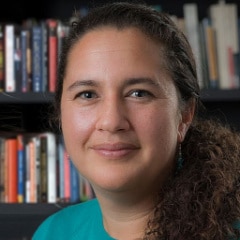
Dr. Bang’s research focuses on understanding culture, learning, and development broadly with a specific focus on the complexities of navigating multiple meaning systems in creating and implementing more effective learning environments in science, technology, engineering, arts, and mathematics education. Megan approaches her work through rigorous mixed methods – utilizing experimental design in her foundational cognition and development studies, to community based participatory design work in which she co-designs learning and teaching with communities, families, and youth as well as engages in the collaborative study of such environments. She conducts research in both schools and informal settings. She has taught in and conducted research in teacher education as well as leadership preparation programs. She is currently serving on the Board of Science Education at the National Academy of Sciences and the editorial boards of several top journals. Megan is also a Professor of the Learning Sciences and Psychology at Northwestern University.
She earned her PhD in Learning Sciences at Northwestern University.
Carolyn Barber, University of Missouri, Kansas City

Carolyn Barber joined the School of Education at the University of Missouri, Kansas City as an Assistant Professor in 2007 and, as of 2019, is a Professor in the Division of Educational Leadership, Policy, and Foundations. As a faculty member specializing in educational research and psychology, she has taught coursework in developmental psychology, educational psychology, research methodology, and statistics to students across the School of Education and the UMKC campus. She has also worked as an advisor in the Counseling Psychology Ph.D. and Interdisciplinary Ph.D. programs. From 2017 to 2020 she served as Associate Dean of the School of Education, with responsibilities centered on faculty affairs, graduate affairs, and assessment and accreditation.
Dr. Barber’s research explores the way that schools support positive development in adolescents and young adults, and how those supports vary across a variety of social and cultural contexts. She has particular interests in role that such contexts play in the development of civic attitudes and behaviors. She is trained in quantitative methodologies and specializes in the use of complex-sample and multilevel techniques to address these questions using large-scale survey data. Prior research has been funded by the Spencer Foundation, the National Endowment for the Arts, the AERA Grants Program, and the National Science Foundation.
Nancy Beadie, University of Washington
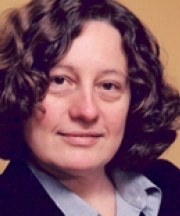
Nancy Beadie is Professor and Chair of Educational Leadership and Policy Studies in the College of Education at the University of Washington. Beadie’s research focuses on historical relationships among education, economics, and state formation at local, state, national, and international levels. Her current book project, Paramount Duty of the State: Education and State Formation in the U.S., 1846-1912, analyzes the significance of education in federal policy and the process of state (re)formation during the rise of the US as a global economic and imperial power at the end of the 19th century. Previous publications include Education and the Creation of Capital in the Early American Republic (Cambridge University Press, 2010), which won the Outstanding Book Award from the History of Education Society and Chartered Schools: Two Hundred Years of Independent Academies in the United States, 1727-1925 (NY: Routledge Press, 2002), co-edited with Kim Tolley, as well as a numerous articles in US and international journals. In addition to the politics and economics of education, Dr. Beadie has written extensively on the history of women in education. This work includes two articles for which she received the prize for Best Article Published in a Refereed Journal awarded by the History of Education Society. Other publications include an essay on the rise of national educational systems in North America, for the Oxford Handbook on the History of Education, edited by John Rury and Eileen Tamura, scheduled for 2019 and another on federal education policy and the rise of social science research published in the Centennial Anniversary Volume of the Review of Research on Education, 2016. Dr. Beadie is currently senior editor of History of Education Quarterly. She has also served as President of the History of Education Society (U.S.) and as Vice-President of the American Educational Research Association for Division F (History and Historiography).
Leah Bricker, Spencer Foundation/Northwestern University
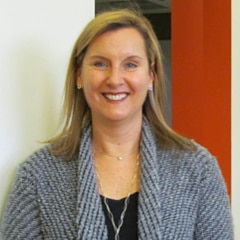
Leah Bricker started her career as a middle school science teacher before serving as the State Science Coordinator at the Indiana Department of Education, where she was involved in all aspects of K-12 science education (e.g., standards, assessments, professional development, partnerships among science education stakeholders in the state). Leah then served as a Senior Program Associate at the American Association for the Advancement of Science’s Project 2061, where she helped design and facilitate professional development programs for K-12 science teachers across the country. She also worked on a project focused on STEM assessments and their alignment to learning goals. Leah earned her PhD in the Learning Sciences at the University of Washington in 2008. She was involved in science teacher education at both Loyola University Chicago and The University of Michigan as an Assistant Professor. Leah is currently also a Research Associate Professor at Northwestern University in the School of Education and Social Policy. She studies youths’ STEM-related learning pathways over time and across contexts (e.g., home, school, afterschool, neighborhoods, museums) using qualitative methods and design-based research.
Zoe Burkholder, Montclair State University

Zoe Burkholder is Associate Professor of Educational Foundations and
Director of the Holocaust, Genocide, and Human Rights Education Project at Montclair State University. Dr. Burkholder is an historian of education whose research focuses on the history of racial equality and school integration in the United States, from the 1840s through the present. She is the author of Color in the Classroom: How American Schools Taught Race, 1900-1954 (Oxford University Press, 2011), as well as numerous scholarly journal articles and political commentaries. She received a Ph.D. in the History of Education from New York University; an M.A. in Anthropology from the University of California, Berkeley; and a B.A. in Anthropology and Archaeology from the University of Virginia.
Nolan Cabrera, University of Arizona

Dr. Nolan Cabrera is an Associate Professor in the Center for the Study of Higher Education at the University of Arizona. He studies the racial dynamics on college campuses, with a particular focus on Whiteness, and was the only academic featured in the MTV documentary White People. Dr. Cabrera is also involved in the controversary surrounding the Tucson Unified School District’s former Mexican American Studies program. He is a recipient of the prestigious education early career award, the Spencer/National Academy of Education postdoctoral fellowship. Dr. Cabrera’s publications have appeared in the leading education and higher education journals such as American Educational Research Journal, Review of Higher Education, Journal of College Student Development, and Research in Higher Education, and his work has been used extensively in education, policy, and legal environments. Dr. Cabrera is a UA College of Education Erasmus Scholar, Emerging Scholar for the American College Personnel Association, Faculty Affiliate with UT Austin’s Project M.A.L.E.S., and Faculty Fellow for the American Association for Hispanics in Higher Education. He completed his graduate work at UCLA in Higher Orgranization & Organizational Change and Dr. Cabrera earned his BA from Stanford University in Comparitive Studies in Race and Ethnicity (Education focus). He is a former Director of a Boys & Girls Club in the San Francisco Bay Area, and is originally from McMinnville, Oregon.
Claudia Cervantes-Soon, Arizona State University University

Situated at the intersections of educational anthropology, critical pedagogy, bilingual education, and Chicana/Latina feminisms, Dr. Cervantes-Soon’s work examines the interplay of sociocultural factors including race, class, gender, language, and citizenship/immigrant constructs in her analyses of educational contexts. Through community engaged and critical ethnographic approaches, her research captures the relationships between the localized, nuanced, and grounded perspectives and the larger global, ideological, geopolitical, and economic forces shaping contexts and practices. Dr. Cervantes-Soon’s work seeks to recognize the intersectional identities and subaltern knowledges that are often ignored by dominant discourses about minoritized and border/transborder communities. Her research focuses on two broad areas of inquiry: 1) Equity and social justice in bilingual education, and 2) Borderlands/transborder Mexicana/Latina youth literacies and critical pedagogies.
Dr. Cervantes-Soon’s most recent research examines the inequalities persistent in two-way dual language education and the possibilities to reclaim a focus on critical consciousness and historically marginalized, culturally diverse, and lingustically minoritized populations in bilingual education. Her current research project, “Building Black and Brown Bridges of Solidarity through Dual Language Education,“ has been supported by a 2017 National Academy of Education/Spencer Postdoctoral Fellowship. Her contributions to the field of bilingual education have been recently recognized by a 2019 Early Career Award from the American Educational Research Association – Bilingual Education Research SIG. Dr. Cervantes-Soon’s is also the author of “Juárez Girls Rising: Transformative Education of Times of Dystopia,” which received a 2017 Critics’ Choice Award from the American Educational Studies Association, and a 2017 C. Wright Mills Award from the Society for the Study of Social Problems, one of the most important book awards in the social sciences.
Hilary Conklin, DePaul University
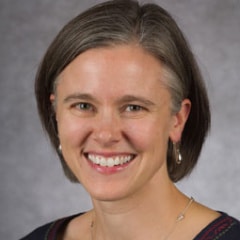
A former middle and high school social studies teacher, Dr. Conklin’s teaching and research are anchored by a vision of democratic, justice-oriented teaching, learning, and teacher education. Guided by these commitments, her research explores the design of teacher preparation experiences, the impact of these experiences on teachers’ practices and their students’ learning, and youth learning from civic education. Her research has been funded by the Spencer Foundation, the Brinson Foundation, and a National Academy of Education-Spencer Postdoctoral Fellowship. She has written about her research in academic journals and in media outlets including The Atlantic, Time, and The Washington Post.
Maia Cucchiara, Temple University

Dr. Maia Cucchiara’s research interests fall into three often-overlapping categories. First, she is interested in urban education policy, particularly in the intersections between policy assumptions and discourses, issues of race and class, and people’s lived experiences. Second, she studies family-school relations, with a focus on how class shapes parents’ experiences with urban schools and their children’s education more broadly. Third, she is interested in the impact of urban development and revitalization on public education and the implications for disadvantaged students. Dr. Cucchiara is the author of Marketing Schools, Marketing Cities: Who Wins and Who Loses When Schools Become Urban Amenities (University of Chicago Press, 2013). Her current project, an ethnographic study of low-income mothers’ experiences with parenting education, is funded by a postdoctoral fellowship from the National Academy of Education/Spencer Foundation.
Matt Diemer, University of Michigan

Matthew Diemer is Professor of Education at the University of Michigan. Diemer is a developmental psychologist who examines how young people resist, challenge, and overcome racial, ethnic, socioeconomic and other constraints in school, college, work, and civic/ political institutions.
He is particularly interested in how marginalized people develop critical consciousness, which is a careful analysis of societal inequalities, the motivation to produce social change, and participation in social or political action. His recent work examines best practices in conceptualizing and measuring social class, the validation of a critical consciousness scale, and how family wealth contributes to intergenerational success. He received his PhD from Boston College.
Sarah Dryden-Peterson, Harvard University
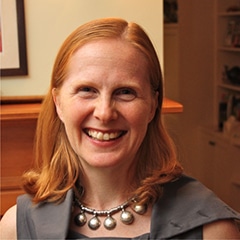
Sarah Dryden-Peterson is Associate Professor of Education at Harvard University. Dryden-Peterson leads a research program that focuses on the connections between education and community development, specifically the role that education plays in building peaceful and participatory societies. In her field-based research globally, in her teaching, and in her role as founder and director of REACH, she examines what it would take for all children to access quality education, be part of welcoming communities, and contribute to building peaceful futures. Her research connects practice, policy, and scholarship and is strengthened through sustained collaborations with communities, NGOs, governments, and UN agencies, with a focus on low- and middle-income countries particularly those that are conflict-affected. Dryden-Peterson’s research has played critical roles in shaping global policy and local programs that have the potential to create quality, conflict-informed, and future-creating education for millions of children globally in settings of migration and displacement. Raised in Toronto, Canada, Dryden-Peterson taught primary and middle school in Madagascar, South Africa, and the United States.
Ansley Erickson, Columbia University
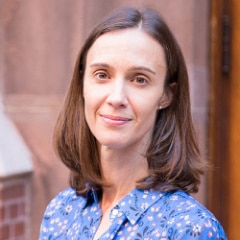
Ansley T. Erickson is Associate Professor of History and Education Policy at Teachers College, Columbia University. Erickson is a historian who focuses on educational inequality and urban and metropolitan history. Her first book, Making the Unequal Metropolis: School Desegregation and Its Limits (University of Chicago Press, 2016) tells the story of persistent inequality in Nashville, Tennesee’s metropolitan school district during periods of segregation and desegregation. Her writing has appeared in the American Journal of Education, History of Education Quarterly, Journal of Urban History, and Teachers College Record, as well as in Dissent and Chalkbeat. In fall 2017, she was a Scholar in Residence at the Schomburg Center for Research in Black Culture of the New York Public Library.
With Professor Ernest Morrell of Notre Dame, Erickson leads the Harlem Education History Project, a collaborative investigation into the history of education in 20th century Harlem. The project includes an edited volume under contract with Columbia University Press, a digital history project, and youth participatory history program.
Erickson was a National Academy of Education/Spencer Postdoctoral Fellow in 2011-2013, and has held research fellowships from the Spencer Foundation and the Eisenhower Institute among others. She currently serves on the editorial board of the History of Education Quarterly and Theory and Research in Education, and was chair of the History of Education Society Outstanding Book Prize committee in 2015-16.
Earlier in her career, Erickson taught history and conducted ethnographic research in New York City schools and worked at two national education organizations. She also has experience in historical documentary film and public history consulting.
Nelson Flores, University of Pennsylvania
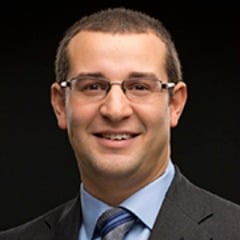
Nelson Flores began his career as an ESL teacher in Philadelphia and New York City public schools. Many of his students were categorized as “Long Term English Learners” who had been officially designated as English Learners for seven or more years. The disconnect between the deficit perspectives typically used to describe these students and the fluid bilingualism he observed them engaged in on a daily basis led him to pursue a Ph.D. in Urban Education from the Graduate Center of the City University of New York.
Dr. Flores has collaborated on several research projects focused on the education of language-minoritized students in U.S. schools, including a study of students officially categorized as “Long Term English Learners” and a study of successful high schools serving large numbers of Latinx students. He also served as project director for the CUNY–New York State Initiative on Emergent Bilinguals, a New York State Education Department initiative seeking to improve the educational outcomes of emergent bilingual students through an intensive seminar series for school leaders, combined with onsite support by CUNY faculty. His most recent collaboration has been with The Center on Standards, Alignment, Instruction, and Learning (C-SAIL), where he is studying the historical development of and contemporary implementation of standards-based reform for students officially classified as English Learners.
Dr. Flores was the recipient of the 2017 AERA Bilingual Education SIG Early Career Award, a 2017 Spencer Postdoctoral Fellowship, and the 2019 James Atlas Prize for Research on Language Planning and Policy in Educational Contexts. He is also on several editorial boards including The International Journal of the Sociology of Language, Annual Review of Applied Linguistics, and Multilingua.
Vanessa Fong, Amherst College
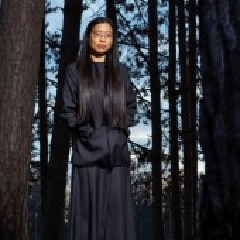
Vanessa Fong is Olin Professor in Asian Studies at Amherst College. Fong graduated from Amherst College with a major in Anthropology in 1996, received her PhD in Anthropology from Harvard University in 2002, and was Assistant Professor and then Associate Professor at the Harvard University Graduate School of Education from 2003 to 2012, before returning to Amherst College in 2012. She is interested in how the experiences of a partly transnational cohort of Chinese only-children and their families shed light on anthropological, sociological, and psychological theories. Her research focuses on a cohort of youth born under China’s one-child policy between 1979 and 1986. She has been engaged since 1998 in a longitudinal project that will follow this cohort and their children throughout the course of their lives. The first phase of this project was based on a survey of 2,273 members of this cohort (conducted in 1999 while they were in grades 8–12 in Dalian, China), and on participant observation in their schools, homes, and other social settings. She is now using re-surveys of, interviews with, and participant observation among that cohort and their spouses, parents, and children to examine how the parenting, education, gender socialization, and socioeconomic conditions they had as adolescents shape their lives now that they are adults in their 30s with children of their own, especially with regards to smoking, gender, health, happiness, education, fertility, childrearing, environmentalism, human development, socioeconomic stratification, and transnational migration.
Antero Garcia, Stanford University

Antero Garcia is Assistant Professor in the Graduate School of Education at Stanford University. Antero studies how technology and gaming shape youth learning, literacy practices, and civic identities. Prior to completing his Ph.D., Antero was an English teacher at a public high school in South Central Los Angeles. His two most recent research studies explore learning and literacies in tabletop roleplaying games like Dungeons & Dragons and how participatory culture shifts classroom relationships and instruction. Based on his research, Antero co-designed the Critical Design and Gaming School–a public high school in South Central Los Angeles. Antero’s research has appeared in numerous journals including The Harvard Educational Review, Teachers College Record, and Teaching and Teacher Education. His most recent book–Good Reception: Teens, Teachers, and Mobile Media in a Los Angeles High School—is an ethnographic look at technology and gaming in an urban high school. Some of his other books explore critical research methodologies (Doing Youth Participatory Action Research: Transforming Inquiry with Researchers, Educators, and Students–with Nicole Mirra and Ernest Morrell), techniques for shifting English language arts pedagogy (Pose, Wobble, Flow: A Culturally Proactive Approach to Literacy Instruction with Cindy O’Donnell-Allen), and changes in the consumption of young adult literature (Critical Foundations in Young Adult Literature: Challenging Genres). Antero received his Ph.D. in the Urban Schooling division of the Graduate School of Education and Information Studies at the University of California, Los Angeles.
Gina Garcia, University of Pittsburgh
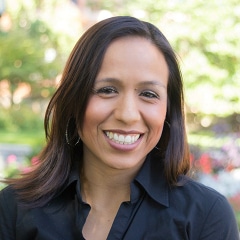
Dr. Gina Ann Garcia is an associate professor in the department of Administrative and Policy Studies at the University of Pittsburgh, where she teaches master’s and doctoral students pursuing degrees in higher education and student affairs. Her research centers on issues of equity and justice in higher education with an emphasis on three core areas: Hispanic Serving Institutions (HSIs; postsecondary institutions that enroll at least 25% Latinx undergraduate students), Latinx college students, and race and racism in higher education.
Dr. Garcia has made numerous presentations at national conferences, including the American Educational Research Association (AERA), Association for the Study of Higher Education (ASHE), and ACPA College Student Educators International, and co-authored multiple publications in top journals including American Educational Research Journal, The Review of Higher Education, and Journal of Diversity in Higher Education. She has given talks at over 20 colleges and universities, including Guttman Community College (CUNY), the University of California, Santa Cruz, and the University of Arizona. Dr. Garcia was the recipient of postdoctoral fellowships from both the Ford Foundation (2016) and the National Academy of Education/Spencer (2017). In spring 2018, she received the Early Career Scholar Award from AERA’s Hispanic Research Issues SIG and in fall 2018 she was the recipient of the ASHE CEP Mildred García Award for Exemplary Scholarship (Junior). She is the author of Becoming Hispanic-Serving Institutions: Opportunities for Colleges & Universities, published by Johns Hopkins University Press.
Dr. Garcia graduated from California State University, Northridge with a bachelor’s degree in marketing and the University of Maryland, College Park with a master’s degree in college student personnel. She was a STEM retention coordinator at California State University, Fullerton, funded by a Department of Education Title V grant for developing HSIs. She also held a position funded by a National Science Foundation grant, working with community college transfer students who wanted to major in science and math. She graduated from University of California, Los Angeles with a Ph.D. in higher education and organizational change, where she worked with Dr. Sylvia Hurtado at the Higher Education Research Institute.
Scott Gelber, Wheaton College

Scott Gelber specializes in the history of American higher education. His most recent book is Grading the College: A History of Evaluating Teaching and Learning (Johns Hopkins University Press, 2020). Whereas critics routinely dismiss evaluation as a recent manifestation of misguided external accountability, Grading the College reframes the pursuit of more systematic assessment of institutional performance as a genuine intellectual challenge that has engaged professors for more than a century. This work was supported by a grant from the Spencer Foundation. Gelber’s second book, Courtrooms and Classrooms: A Legal History of American College Access, 1860-1960 (Johns Hopkins University Press, 2015) revealed that early judicial deference toward colleges was contingent on their perceived service to the public interest. The project was supported by a National Academy of Education/Spencer Foundation postdoctoral fellowship. Titled The University and the People: Envisioning American Higher Education in an Era of Populist Protest (University of Wisconsin Press, 2011), Gelber’s first book argued that the core principles of public higher education evolved out of a taut relationship between grassroots activism and professorial expertise during the late nineteenth century. The project was supported by grants from the Spencer Foundation and the Charles Warren Center for Studies in American History. In 2012, it won the Linda Eisenmann Prize of the History of Education Society. He is currently researching the history of teacher recruitment.
Jon Hale, University of Illinois, Urbana-Champaign
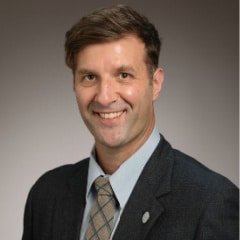
Jon Hale is Associate Professor of Education Policy, Organization and Leadership and Curriculum and Instruction at the University of Illinois, Urbana-Champaign. Hale’s research focuses on the history of American education, specifically the history of student and teacher activism, education reform during the Civil Rights Movement, and the intersection of race and policy in the field of education. His other research interests include the desegregation of K-12 education, the history of grassroots education reform efforts, and the origins of school choice and neoliberal education policy. Hale is also interested in public, local and oral history as a means to document the history of American education through community engagement. Hale’s research has been recognized through awards from the National Academy of Education, the Spencer Foundation, and the American Educational Research Association.
Andrew Hartman, Illinois State University

Andrew Hartman is Professor of History at Illinois State University, where he teaches courses in U.S. intellectual, cultural, and political history, as well as courses in the philosophy of history, historiography, and pedagogy. Professor Hartman’s first book, Education and the Cold War: The Battle for the American School, was published by Palgrave Macmillan in 2008. Hartman’s second book, A War for the Soul of America: A History of the Culture Wars, was published by the University of Chicago Press in 2015 and has been widely reviewed in popular and academic journals ranging from The Wall Street Journal and New Republic to the American Historical Review and Reviews in American History. Hartman is currently at work on his third book, Karl Marx in America, which is contracted to be published by the University of Chicago Press. Hartman is the winner of two Fulbright Awards. He was the Fulbright Distinguished Chair in American Studies at the University of Southern Denmark for the 2013-14 academic year, and he is the Fulbright British Library Eccles Center Research Scholar for the 2018-19 academic year. He is an editorial advisor for the University of Chicago Press, and is an Organization of American Historians (OAH) Distinguished Lecturer for the 2015-2021 period. He was the founding President of the Society for U.S. Intellectual History (S-USIH), and he wrote for the Society’s award-winning blog from 2007 until his retirement from the blog in 2018. Hartman has been published in a host of academic and popular venues, including the Washington Post, Baffler, Chronicle of Higher Education, American Historian, Journal of American Studies, Reviews in American History, Journal of Policy History, Salon, Jacobin, Bookforum, and In These Times. Hartman also co-hosts a podcast dedicated to intellectual history, titled “Trotsky and the Wild Orchids.”
Professor Hartman received his Ph.D. in History from the George Washington University in 2006. Hartman is from Denver and is married to Erica Hartman. They have two sons, Asa and Eli.
Deborah Hicks-Rogoff, Duke University
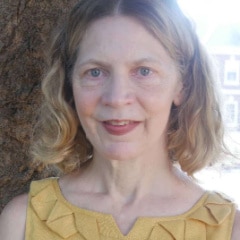
Deborah Hicks-Rogoff was raised in a small Appalachian town in North Carolina. Educated in public schools, she earned a doctorate in Education and Human Development from Harvard University in 1988. She has been a teacher, researcher and writer for over two decades, focusing on children in America’s poor and working-class communities. A well-known voice in the education community for her writings about literacy, Hicks-Rogoff has published two books on educational research, along with numerous journal and magazine articles. Her most recent book is a memoir about her teaching experiences in an Appalachian neighborhood in Cincinnati: The Road Out: A Teacher’s Odyssey in Poor America.
Hicks-Rogoff heads a Bass Connections project on education and economic inequality in Appalachia. She’s also the founder and executive director of the Partnership for Appalachian Girls’ Education (PAGE), a partnership between Duke’s Program in Education, Madison County Public Schools, and the communities of Spring Creek, Hot Springs, and Laurel, North Carolina that creates opportunities for educational enrichment for young women through mentorship and summer programming.
Cindy Hmelo-Silver, Indiana University
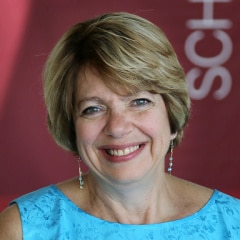
Cindy Hmelo-Silver focuses on how people learn about complex phenomena and how technology can help support that learning. As part of this work, she studies problem-based learning, collaborative knowledge construction, and computer supported collaborative learning. She studies the role of technology to support social knowledge construction and collaborative learning and problem-solving.
Her research investigates scaffolded support for problem-based learning, the use of video for learning, and complex systems understanding. Her current projects include a research synthesis of computer-supported collaborative learning, developing adaptive support for collaborative learning in a game-based learning environment, assessment of systems thinking, and conceptualizing collaborative engagement.
In her most recent work in collaboration with colleagues in informatics, she is exploring how human-centered robotics can help promote STEM engagement and learning in middle and high school youth.
Li-Ching Ho, University of Wisconsin-Madison
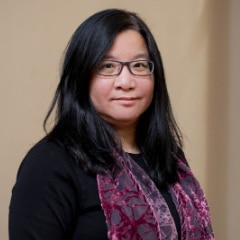
Li-Ching Ho is an associate professor in the Department of Curriculum and Instruction, and a Faculty Director of Global Engagement of the School of Education. Her research, conducted primarily in East and Southeast Asia, focuses on global issues of diversity in civic education, differentiated access to citizenship education, and environmental citizenship. She was previously a recipient of the Vilas Faculty Early Career Investigator Award and the College and University Faculty Assembly Early Career Research Award. She is a co-editor of The Palgrave Handbook of Global Citizenship and Education and has published research in Theory and Research in Social Education, Journal of Curriculum Studies, Teachers College Record and Teaching and Teacher Education. She has also worked closely with scholars, teachers, and students in numerous countries such as China, Japan, South Korea, Singapore, Brunei and the Philippines.
Ilana Horn, Vanderbilt University

Dr. Ilana Horn’s work is motivated by the underperformance of American secondary students in school mathematics. Her research centers on ways to make authentic mathematics accessible to students, particularly those who have historically been disenfranchised by our educational system. “I focus primarily on mathematics teaching in two ways,” says Dr. Horn, “first, I look at classroom practices that engage the most students in high quality mathematics. Second, viewing teaching as a situated practice, I am interested in how school environments, communities, colleagues, and policies shape what is instructionally possible. My scholarship lies at the intersection of mathematics education, learning sciences, and sociology of teachers’ work.”
Dr. Horn’s research projects have spanned questions of in-service teachers’ professional learning, pre-service education, district level instructional improvement, and students’ experiences of different forms of mathematics instruction. “These projects implicate the way teachers’ work is organized in supporting the best forms of instruction for students. Theoretically, I draw on ethnomethodology and sociocultural studies of learning. Methodologically, I conduct comparative case studies with discourse analysis as a tool to understand local meanings.”
Ann Ishimaru, University of Washington

Dr. Ishimaru’s scholarship focuses on the intersection of leadership, school-community relationships, and educational equity in P-12 systems. Her work focuses on improving educational leadership – both formal and family/community – to create equitable educational environments, with a particular focus on students, families, and communities who have been historically marginalized in education. Formal P-12 educational leadership plays a vital role in addressing persistent disparities in student learning, outcomes, and success, but the field continues to struggle with how to understand and engage in practices that will provide meaningful educational opportunities for non-dominant students. Moreover, parent and community leadership holds promise for improving educational systems, but equitable collaboration across educational and parent leadership is rare. Dr. Ishimaru engages in community-based research to build collaborative leadership capacity for improving educational systems and leveraging the expertise and priorities of the students, families, and communities who have been least well served in these systems.
Uma Jayakumar, University of California, Riverside

Uma M. Jayakumar is an Associate Professor in the Graduate School of Education at University of California, Riverside. Her scholarship and teaching address racial justice and policy issues in higher education, with a focus on how institutional environments such as campus climates and cultures shape college access and outcomes and how students’ experience and resist barriers to inclusive engagement. Jayakumar received her doctorate in Higher Education and Organizational Change from the University of California at Los Angeles. Prior to UCR she was a Faculty Associate at the Institute for Social Research at the University of Michigan and an Associate Professor of Leadership Studies at the University of San Francisco, where she cofounded a Higher Education and Student Affairs (HESA) master’s program with a mission of transforming organizational environments toward increasing racial diversity, justice, and inclusion. Jayakumar’s research has been generously supported by postdoctoral fellowship awards from the National Center for Institutional Diversity (2008–2009), the National Academy of Education/Spencer (2013–2014), and the Ford Foundation (2014–2015).
Jayakumar was one of 21 social science researchers who co-developed amicus briefs summarizing key research findings related to the use of race-conscious admissions practices, in the 2 most recent affirmative action national cases. The briefs, submitted to The Supreme Court by the Civil Rights Project at UCLA, supported the need for race-conscious admissions and diversity/inclusion in Higher Education Institutions. In addition to these Social Scientists briefs, her work informed amici submitted to the Supreme Court by the American Educational Research Association (AERA), American Psychological Association (APA), National Women’s Law Center, 17 United States Senators, Harvard Graduate School of Education Students for Diversity, Asian American Center for Advancing Justice, amongst other briefs. Jayakumar’s scholarship is also featured in Educational Researcher, Journal of Higher Education, Harvard Educational Review, Diverse Magazine, and reports to foundations and organizations interested in advancing diversity and inclusion.
Erika Kitzmiller, University of Pennsylvania
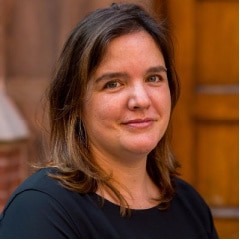
Erika M. Kitzmiller is a historian of race, inequality, and education whose scholarship examines the historical process and current reform efforts that have contributed to inequality today. She is a Term Assistant Professor in Education at Barnard College, Columbia University and a research affiliate with the Institute for Urban and Minority Education at Teachers College, Columbia University. Her first book manuscript, The Roots of Educational Inequality: Philadelphia and Germantown High School, 1907 – 2014 is currently under contract with the University of Pennsylvania Press.
Erika’s scholarship has appeared in Teachers College Record, the Pennsylvania Magazine of History and Biography, Dissent, Reuters, and the Hechinger Report. She has received funding for her work from the University of Pennsylvania, Harvard University, the National Academy of Education/Spencer Foundation, Teachers College, Columbia University, and the National Science Foundation.
Erika completed her joint Ph.D. in History and Education, Culture, and Society and her Master’s in Public Administration at the University of Pennsylvania and her bachelor’s degree in History and Italian from Wellesley College. She lives in Morningside Heights with her husband and their two young children.
Jane Lo, Florida State University
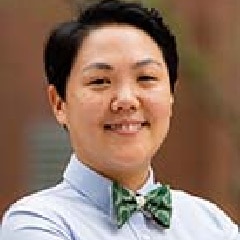
Jane C. Lo is an assistant professor of teacher education at Michigan State University. Her research focuses on civic education broadly. Specifically, she is interested in the political engagement of youth, social studies curriculum development and the inequalities that exist within traditional civic education. Her methodological expertise includes mixed-methods designs and design-based implementation research. She teaches undergraduate and graduate courses in social studies methods. Her most recent work can be found in Multiple Perspectives and Democracy & Education. Prior to becoming a teacher educator, she taught government, economics and Chinese in Austin, Texas.
Rosina Lozano, Princeton University
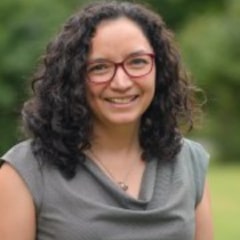
Rosina Lozano is Associate Professor of History at Princeton University. Lozano is a historian of Latino history with a research and teaching focus on Mexican American history, the American West, migration and immigration, and comparative studies in race and ethnicity.
Lozano’s first book, An American Language: The History of Spanish in the United States (University of California Press, 2018), is a political history of the Spanish language in the United States from the incorporation of the Mexican cession in 1848 through World War II, with some discussion of the following decades and present-day concerns. The nation has always been multilingual, and Spanish-language rights, in particular, have remained an important political issue into the present. The book is organized in two parts. The first five chapters argue that Spanish was a language of politics in the U.S. Southwest following the U.S. takeover. The second half of the book transitions to exploring the multifaceted use of Spanish in the twentieth century as it became a political language that instigated local and national political debates related to immigration and Americanization and aided the hemispheric interests of the nation.
An American Language received the PROSE award in Language and Linguistics (2019) and the First Book Prize from the Immigration and Ethnic History Society. Lozano was featured on Al Punto with Jorge Ramos and has given numerous academic and public talks about her book.
Lozano is working on a second book, tentatively titled Intertwined Roots: Mexican Americans and Native Americans in the Southwest, which tells the story of the ever-changing relationship between Mexican Americans and Native peoples from 1848 through the 1970s. The results of U.S. policies for each of these groups are well known separately, but Intertwined Roots considers them relationally, never forgetting that their connections preceded these policies and continued to form independent of them, too. Through the comparison, the book also explores the impact of state and federal politics on ethnic identities. Triangulating the analysis of Anglos, Mexican Americans, and Native Americans offers the opportunity to understand how local and state power has shaped the Southwest against the backdrop of federal policy.
Lozano has received fellowships from the Huntington Library and the New Mexico Office of the State Historian to aid her research. During the 2012-2013 academic year, Lozano held a postdoctoral fellowship from the National Academy of Education/Spencer Foundation that she completed at the Center for Comparative Studies in Race and Ethnicity (CCSRE) at Stanford University.
At Princeton, Lozano is associated with the Program in Latino Studies, the Program in American Studies (where she is a member of the Executive Committee), the Program in Latin American Studies, the Princeton-Mellon Urban Studies Program, and the PIIRS-sponsored Migration: People and Cultures Across Borders research group.
Jeff MacSwan, University of Maryland, College Park

Jeff MacSwan is Professor of Applied Linguistics and Language Education at the University of Maryland. He is also Professor of Neuroscience and Cognitive Science, and Professor of Linguistics by courtesy. MacSwan’s research program focuses on the linguistic study of bilingualism and codeswitching (or language alternation), and their implications for theories about the role of language in educational settings for multilingual students. He is the editor of the International Multilingual Research Journal, and serves on several editorial boards. Examples of his published work appear in American Educational Research Journal, Bilingualism: Language and Cognition, Lingua, Hispanic Journal of Behavioral Sciences, Teachers College Record, and in edited collections, handbooks and anthologies. MacSwan recently served on the Committee on Fostering the Development and Educational Success of Dual Language Learners of the National Academies of Sciences, Engineering, and Medicine, and is a Fellow of the American Educational Research Association and of the National Education Policy Center.
Katherine Magnuson, University of Wisconsin-Madison

Katherine Magnuson’s research focuses on the well-being and development of economically disadvantaged children and their families. She examines how disparities in socioeconomic status (SES) affect children’s development, and how these effects may be altered by policies and programs, especially early childhood education programs. She also investigates how maternal education impacts child development.
Specifically, Katherine blends two streams of research that are often considered separately: (1) research on the influence of parents’ employment, income, and education, as well as welfare policies, on children’s well-being, with a special emphasis on the extent to which differences in SES across racial and ethnic groups explain disparities in children’s school performance; and (2) research on direct child interventions, particularly early education, that may serve a compensatory role for disadvantaged children. The first body of literature illuminates the scope of possible benefits that may accrue to children from interventions that directly improve the well-being of their parents, while the second line of research provides insights regarding how directing services and resources to children, rather than to their parents, may buffer the harmful effects of being raised in a disadvantaged family.
Ebony McGee, Vanderbilt University
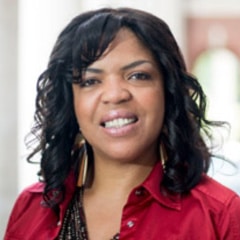
As an associate professor of diversity and STEM education at Vanderbilt University’s Peabody College, Ebony McGee investigates what it means to be racially marginalized while minoritized in the context of learning and achieving in STEM higher education and in the STEM professions. She studies in particular the racialized experiences and racial stereotypes that adversely affect the education and career trajectories of underrepresented groups of color. This involves exploring the social, material, and health costs of academic achievement and problematizing traditional forms of success in higher education, with an unapologetic focus on Black folk in these places and spaces. Her National Science Foundation (NSF) CAREER grant investigates how marginalization undercuts success in STEM through psychological stress, interrupted STEM career trajectories, impostor phenomenon, and other debilitating race-related trauma for Black, Indigenous, and Latinx doctoral students. Education is her second career; she left a career in electrical engineering to earn a PhD in mathematics education from the University of Illinois at Chicago, a Spencer Postdoctoral Fellowship at the University of Chicago, and a National Science Foundation Postdoctoral Fellowship at Northwestern University. With funding from six NSF grants, she cofounded the Explorations in Diversifying Engineering Faculty Initiative or EDEFI (pronounced “edify”). She also cofounded the Institute in Critical Quantitative and Mixed Methodologies Training for Underrepresented Scholars (ICQCM), which seeks to be a “go-to” institute for the development of quantitative and mixed-methods skillsets that challenge simplistic quantifications of race and marginalization. ICQCM was founded with support from the National Science Foundation, the Spencer Foundation, and the W. T. Grant Foundation. She is the lead editor of the recently published book Diversifying STEM: Multidisciplinary Perspectives on Race and Gender (2019), which offers scholarship that includes race, culture, and social stratification; racial justice and identity; racial socialization processes; and race and gender intersectionality in STEM. Her research has been featured in prominent media outlets including The Atlantic, Diverse Issues in Higher Education, The Chronicle of Higher Education, NPR’s Codeswitch, The Hechinger Report, Christian Science Monitor, Huffington Post, US News & World Report, Inside Higher Education, Tennessean, and The UK Voice Online. Diversifying STEM is available at https://www.rutgersuniversitypress.org/diversifying-stem/9781978805675. Visit the EDEFI website at https://blackengineeringphd.org/ Visit the ICQCM website at www.CriticalScholars4QuantResearch.org.
Sarah McGrew, University of Maryland, College Park
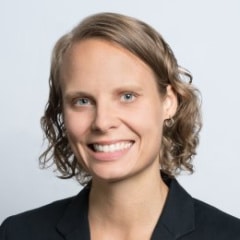
Sarah McGrew is an Assistant Professor in the Department of Teaching and Learning, Policy and Leadership in the College of Education at the University of Maryland, College Park. She studies educational responses to the spread of online mis- and disinformation. Her research focuses on young people’s civic online reasoning—how they search for and evaluate online information on contentious social and political topics—and how schools can better support students to learn effective evaluation strategies.
In collaboration with the Stanford History Education Group, Dr. McGrew developed assessments of students’ online reasoning, conducted research on fact checkers’ strategies for evaluating digital content, and tested curriculum designed to teach these strategies to secondary and college students. This research has been published in journals including Computers & Education, British Journal of Educational Psychology, Teachers College Record, and Theory and Research in Social Education. It also received coverage in outlets including the Wall Street Journal, NPR, Time, and the Chronicle of Higher Education. In addition to investigating online reasoning curricula in secondary and college classrooms, Dr. McGrew’s current research focuses on two related questions: how best to support teachers to learn online reasoning themselves and design lessons for students, and how to design lessons in online reasoning that are rooted in civic and community issues that students know and care about.
A former high school history teacher, Dr. McGrew is also interested in history/social studies teaching and learning. She studies connections between disciplinary and digital literacies in history classes and practice-based approaches to history/social studies teacher education.
Dr. McGrew earned a B.A. in Political Science and Education from Swarthmore College and an M.A. and teacher certification in the Stanford Teacher Education Program. She taught high school history in Washington, D.C. for five years before returning to Stanford to complete her Ph.D. in Curriculum and Teacher Education.
Deborah Michaels, Grinnell College
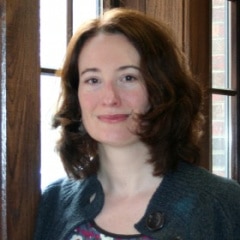
Deborah L. Michaels, Associate Professor of Education, teaches courses in History of Education, International and Comparative Education, General Teaching Methods, and Social Studies Methods. She also mentors student teachers receiving their secondary-school teaching license in any of the social studies disciplines (most commonly in history, government, psychology, sociology, and economics).
Deborah has received numerous national grants and fellowships including a National Academy of Education Postdoctoral Fellowship (2013-2014), a Fulbright Fellowship (2004-2005), a US State Department Speaker Grant (2006), and a Spencer Foundation Dissertation Fellowship (2006-2007).
She earned her B.S. at Cornell University and her M.A. and Ph.D. in Educational Foundations and Policy at the University of Michigan. Her research focuses on national identity politics and the exclusion of minorities in schooling. With funding from the National Academy of Education and Spencer Foundation, she is currently working on a book project tentatively titled Revising the Nation: Citizenship and Belonging in Slovak Schooling, 1910-2010. She is a co-editor and author in three special journal issues (2011-2012) dedicated to investigating how schools teach the Holocaust in post-socialist Europe. Deborah has been conducting research since 2009 with Native Americans, including the Meskwaki Community in Iowa, on how to make history teaching more inclusive of indigenous peoples’ perspectives.
Nicole Mirra, Rutgers University

Nicole Mirra, Ph.D., Assistant Professor of Urban Teacher Education, is constantly striving to bring the two fields of literacy and youth civic engagement together in ways that bring about more social change and justice in classrooms and society. As she began her career teaching high school English in Brooklyn, New York, she was struck by the structures of inequity that were perpetuated in classrooms and was inspired to leverage critical literacy practices as a force to challenge them. Rather than focus on teaching content alone, Mirra believes that content should be used as a vehicle to teach students to lift their voices in public life. Propelled by her love of teaching young people, she now partners with youth as co-researchers in her work and co-designs studies focused on the issues they care about. She aims to shift conversations in the field of literacy to focus on civic engagement and change rather than merely skills and standardized testing. Mirra also incorporates digital media into her teaching and research to bring together students across the nation and open up conversations about the differences and commonalities that exist across U.S. communities.
Mirra pursued English during her undergraduate years and went on to receive two Master’s degrees in English Education and Education Policy. She later pursued her Ph.D. in Urban Schooling. In addition to engaging in research and teaching courses in English Education, Mirra works with the New York City Department of Education to analyze middle school debate programming. Mirra also participates in the National Writing Project (NWP), which works with teachers across the country to encourage civically engaged writing with young people. In partnership with NWP and Teachers College Press, she published a book on what it means to bring empathy into classrooms through a more critical and civic way. She considers her efforts with students to bring more equity and justice to civic life to be her life’s work.
Jennifer Morton, University of North Carolina, Chapel Hill
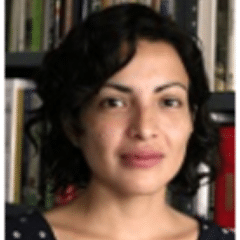
Jennifer Morton joined the University of North Carolina, Chapel Hill, in January 2020 as an Associate Professor and a core faculty member in the Philosophy, Politics and Economics Program. Her primary areas of research are philosophy of action, moral philosophy, philosophy of education, and political philosophy.
Morton’s Reasoning under Scarcity was awarded the Australasian Association of Philosophy‘s Australasian Journal of Philosophy 2017 Best Paper Award and her work in the philosophy of education was awarded the American Philosophical Association’s Scheffler Prize.
During the 2015/2016 academic year, she was a Laurance S. Rockefeller Faculty Fellow at the Princeton Center for Human Values.
Her Moving Up Without Losing Your Way: The Ethical Costs of Upward Mobility is forthcoming with Princeton University Press in Fall 2019.
Laura Munoz, University of Nebraska-Lincoln
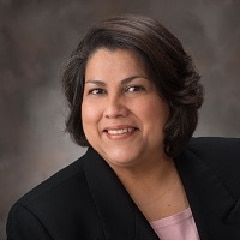
Laura Munoz is Assistant Professor of History and Ethnic Studies at the University of Nebraska-Lincoln. Munoz studies the people and histories of Mexican American, Chicanx and Latinx communities in the United States with an emphasis on race, gender and education in the American West. Understanding this movement and migration of Mexican-heritage people within North America, and particularly the place we know today as the United States, has intrigued her since she was a young person and learned about her own history as a daughter of the borderlands. This concern informs her inquiries about recovering and recuperating Chicanx/Latinx history, especially in places and among populations who remain understudied. In her current book project, “Desert Dreams: Mexican Arizona and the Politics of Educational Equality,” she explores how Mexican Americans embraced public schools as a conduit to political access and cultural preservation in the face of Americanization in the century following the Mexican American War. It reveals how they challenged the structure of “Juan Crow,” the unofficial segregation of Mexican-heritage people in the North American West. It also explains how their civil rights politics would influence the ruling in Brown v. Board of Education (1954) and significantly alter children’s lives across the nation for generations.
Prior to joining UNL, she held the Joe B. Frantz Associate Professorship of American History at Texas A&M University-Corpus Christi — a Hispanic and Minority Serving Institution in her hometown.
Carla O’Connor, University of Michigan
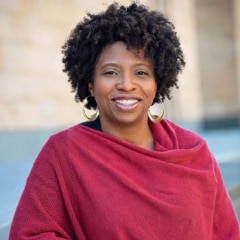
Carla O’Connor is the Director of University of Michigan Wolverine Pathways, a free year-round program that partners with the families, schools, and communities of Detroit, Ypsilanti, and Southfield to support academic success, college admission, and career exploration. She is also Professor of Education and an Arthur F. Thurnau Professor at the University of Michigan. She received an M.A. and Ph.D. in Education from the University of Chicago and a B.A. in English from Wesleyan University. A sociologist of education, Carla O’Connor has expertise in the areas of African American achievement, cultural studies, urban education, and ethnographic methods.
Her work includes examinations of how Black identity is differentially constructed across multiple contexts and influences educational outcomes; how Black people’s perceptions of opportunity vary within and across social space and shape academic orientation; how Black educational resilience and vulnerability is structured by social, institutional, and historical forces; and how the organization and culture of schools influence students’ social and academic identities and outcomes. She is currently conducting a study on race and the co-construction of family-school relations in one demographically diverse elementary school. Her work has been published in the American Educational Research Journal, Educational Researcher, Sociology of Education, Review of Research in Education, Teaching and Teacher Education, and Ethnic and Racial Studies. She co-edited (with Erin McNamara Horvat) the book, Beyond Acting White: Reframing the Debate on Black Student Achievement and has contributed to multiple handbooks and edited volumes that contend with issues of educational inequality and access. She is a founding member of the NSF sponsored Center for the Study of Black Youth in Context.
Django Paris, University of Washington

Django Paris is the inaugural James A. and Cherry A. Banks Professor of Multicultural Education and director of the Banks Center for Educational Justice in the College of Education at the University of Washington. His teaching and research focus on understanding and sustaining languages, literacies, and lifeways among Indigenous, Black, Latinx, Asian and Pacific Islander students in the context of social change and revitalization. He is particularly concerned with educational and cultural justice as outcomes of inquiry and pedagogy. Paris is author of Language across Difference: Ethnicity, Communication, and Youth Identities in Changing Urban Schools (2011), and co-editor of Humanizing Research: Decolonizing Qualitative Inquiry with Youth and Communities (2014), Culturally Sustaining Pedagogies: Teaching and Learning for Justice in a Changing World (2017), and Education in Movement Spaces: Standing Rock to Chicago Freedom Square (2020). He has published in many academic journals, including the Harvard Educational Review and Educational Researcher.
OiYan Poon, Spencer Foundation
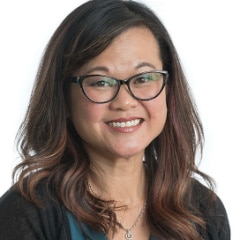
Dr. Poon’s research agenda brings together organizational theories and race and ethnic studies to study selective admissions processes, affirmative action policies, and the racial politics of Asian Americans and education. In her research, she has utilized a range of methods and approaches including critical discourse analysis, narrative inquiry, constructivist grounded theory, community-based participatory research methods, and GIS spatial analysis. As a public scholar, she is a lead co-author of amicus briefs submitted on behalf of social scientists supporting race-conscious admissions in SFFA v. Harvard. Prior to joining Spencer, Dr. Poon was an Associate Professor in the School of Education at Colorado State University. Currently, she is an Associate Professor Affiliate in the Department of Educational Policy Studies at the University of Illinois at Chicago. She earned a Ph.D. in Education with a certificate in Asian American Studies from UCLA and an M.Ed. in College Student Affairs Administration from the University of Georgia
Onnie Rogers, Northwestern University

Onnie Rogers is Assistant Professor at Northwestern University. Her research curiosities lie at the intersection of psychology, human development and education. She is interested in social and educational inequities and the mechanisms through which macro-level disparities are both perpetuated and disrupted at the micro-level of identities and relationships. She asks how our social groups, and the cultural stereotypes that accompany them, shape how we see ourselves and interact with others. Her specific area of research investigates identity development among racially diverse youth in urban contexts. She examines how children and adolescents make sense of their racial, ethnic and gender identities; how cultural stereotypes and expectations shape the development and intersectionality of these identities; and the ways in which multiple identities influence adolescents’ social-emotional and academic outcomes.
Beth Rubin, Rutgers University

Beth Rubin is Professor at Rutgers University. As an educational researcher, she uses critical, sociocultural frameworks and qualitative tools to investigate how young people develop, both as learners and as citizens, amid the interwoven contexts of classroom, school, and community. She explores, through school based ethnographic study, how youth civic identity and belonging take shape within local contexts marked by history, culture, politics and economics, and she considers the intersections and implications of memory, identity and belonging. She works with teachers to design and study curricular and pedagogical innovations that attend to the complexities of youth civic learning amid historical and contemporary injustice.
Janelle Scott, University of California, Berkeley

Janelle Scott is a Professor at the University of California, Berkeley in the Graduate School of Education and African American Studies Department. She holds the Robert C. and Mary Catherine Birgeneau Distinguished Chair in Educational Disparities. Scott earned a Ph.D. in Education Policy from the University of California, Los Angeles Graduate School of Education and Information Studies, and a B.A. in Political Science from the University of California, Berkeley. Prior to earning her doctorate, she taught elementary school in Oakland, Calif.
Her research explores the relationship between education, policy, and equality of opportunity, and centers on three related policy strands: the racial politics of public education, the politics of school choice, marketization, and privatization, and the role of elite and community-based advocacy in shaping public education. Her work has appeared in several edited books and journals, including the Peabody Journal of Education, Educational Policy, American Educational Research Journal, and Harvard Educational Review. She is the editor of School choice and diversity: What the evidence says (2005, Teachers College Press).
Tesha Sengupta-Irving, University of California, Berkeley

Dr. Sengupta-Irving’s research explores the sociocultural, disciplinary, and political dimensions of children’s mathematics learning. Broadly, her work asks a deceptively simple question: What, in addition to mathematics, do children learn when they learn mathematics? Dr. Sengupta-Irving works closely with teachers to understand and design pedagogical approaches that promote racially minoritized children’s fluency in disciplinary ideas and practies, while also engendering a sense of joy, agency, and collectivism in learning. Through a mix of prolonged ethnographic study, teaching experiments, and microanalyses of children’s interactions, her work generates new knowledge to resist neoliberal logics that render math learning a stratifying project of race, class, and gender in schools.
Natalia Smirnov, Northwestern University
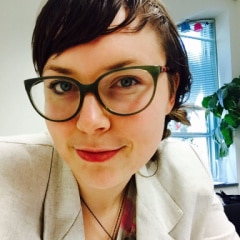
Natalia Smirnov, PhD is a writer, independent scholar, and experience designer living in Philadelphia. Natalia received her doctorate in Learning Sciences from Northwestern University. She has studied Transformational Social Therapy with Charles Rojzman and Warm Data Lab process with Nora Bateson, and has designed and taught classes on media production, human-centered design, multidisciplinary art-making, community development, and organizational ethnography. Currently, Natalia works as a freelance researcher, educational consultant, and occasional editor, and leads the Ludic Liberation Lab – an experimental playgroup for collective liberation.
Amy Stambach, University of Wisconsin-Madison
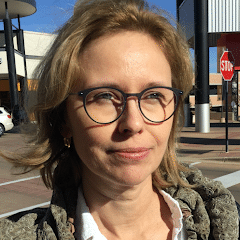
Amy Stambach’s current research examines the production and mobilization of environmental knowledge. Her early work focused on gendered and generational aspects of secondary schooling in East Africa. This led to her interest in U.S. evangelical religious groups’ involvement in providing education to East African students and, more recently, to the study of China-Africa educational programs as seen from the perspectives of African professionals.
Continuing to build on field research she has conducted across two-decades on Mount Kilimanjaro, and on her interests in international development, she is currently studying the social, political, and economic contexts shaping diverse understandings of the environment and climate change. She uses the UN Sustainability Development Goals, governmental and vernacular archives, and ethnographic research in East Africa as points of entry into this project. The ultimate goal of her work is to leverage anthropological knowledge to gain insight into problems facing international institutions and local communities.
Rowan Steineker, Florida Gulf Coast University

Rowan Steineker is an Assistant Professor at Florida Gulf Coast University. She received a Ph.D. in History from the University of Oklahoma in 2016. Her research focuses on the history of education, as well as the intersecting histories of Indigenous and African American peoples in colonial contexts. Her current book project, “The Struggle for Schools” examines the history of education in nineteenth century Indian Territory and early Oklahoma. In particular, it focuses on the institutional history of the nineteenth-century Mvskoke Creek Nation’s self-determined education system and its colonization at the turn of the twentieth century. Her research has received previous support from the Newberry Library, Phi Alpha Theta, and the National Academy of Education/Spencer Foundation and her work has appeared in the History of Education Quarterly.
Sarah Stitzlein, University of Cincinnati

Sarah Stitzlein is a Professor of Education and Affiliate Faculty in Philosophy at the University of Cincinnati. As a philosopher of education, she explores and clarifies key concepts within and purposes of education from the perspective of social and political philosophy. Additionally, she works to uncover problems in education and envision better alternatives. She is especially interested in issues of political agency, educating for democracy, and equity in schools.
Her most recently published book, American Public Education and the Responsibility of Its Citizens: Supporting Democracy in an Age of Accountability (Oxford University Press, 2017), supported by a Spencer Foundation grant, responds to the increasing hostile climate toward public education, especially in the era of school choice and lingering neoliberalism. It argues that citizens should support public schools as a central institution of democracy. Her previous book,Teaching Dissent: Citizenship Education and Political Activism, investigates the role of political dissent in citizenship education. Her AESA Critics Choice award-winning 2008 book, Breaking Bad Habits: Transforming Race and Gender in Schools, draws upon American pragmatism and feminist poststructuralism to offer teachers pathways out of persistent hierarchies of race and gender in schools. This social justice commitment carries throughout her work which has appeared in many journals, including: Educational Theory, Teachers College Record, Review of Educational Research, Journal of Curriculum Studies, Theory and Research in Education, Journal of Philosophy of Education, and Educational Studies. I also serve as co-editor for the journal Democracy & Education and co-direct the Center for Hope and Justice Education.
Amanda Tachine, Arizona State University
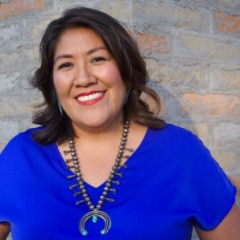
Amanda R. Tachine is Navajo from Ganado, Arizona. She is Náneesht’ézhí Táchii’nii (Zuni Red Running into Water clan) born for Tl’izilani (Many Goats clan). Her maternal grandfather’s clan is Tábaahí (Water’s Edge) and her paternal grandfather’s clan is Ashiihi (Salt). She currently serves as an assistant professor of higher education in the Mary Lou Fulton Teachers College.
Amanda’s research centers on exploring college access and persistence among Indigenous college students using qualitative Indigenous research methodologies. She is drawn to contribute to research and literature that focus on systemic and structural barriers that disenfranchise college access for Indigenous and marginalized populations.
Prior to MLFTC, Amanda taught 7th grade and high school math for Navajo, Tohono Oodham, and Pascua Yaqui nations. Amanda attended graduate school at the Center for Higher Education at the University of Arizona, where she also worked as the Director of Native American Student Affairs and went on to co-found a mentoring program, Native Student, Outreach, Access, and Resiliency (SOAR) in which Native American graduate students and staff mentor Native undergraduate students, who in turn mentor Native high school students. Amandas role in creating Native SOAR contributed towards her national recognition by the Obama administration with the Champions of Change award for empowering young women in recipientsrespective communities.
Amanda teaches contemporary issues in Indigenous higher education, covering topics such as college access, persistence, and sense of belonging, teaching from a decolonial process by emphasizing Indigeneity and Indigenous Knowledge Systems.
Shirin Vossoughi, Northwestern University
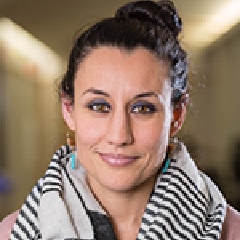
Prior to joining the Learning Sciences faculty at Northwestern University in 2014, Shirin Vossoughi was a postdoctoral fellow at Stanford University and the Exploratorium, where she led an ethnographic study of after-school programs that blend scientific inquiry, literacy and the arts. More broadly, she draws on a range of interpretive methods to study the social, historical, political and ethical dimensions of learning.
Bringing together the ethnographic study of talk and interaction with cultural-historical approaches to learning, Vossoughi seeks to integrate macro-political concerns (the roots of educational inequity, transnational migration, neoliberalism) with detailed studies of educational settings that imagine and enact alternative social relations. Vossoughi’s research centers on hybrid learning environments that blend formal and informal elements and support young people to engage in sophisticated forms of disciplinary thinking while questioning and expanding disciplinary boundaries. She is particularly concerned with the forms of pedagogical mediation and developmental trajectories that take shape within these settings. Vossoughi’s research therefore focuses on the following key phenomena: apprenticeship and joint activity; language and literacy practices; play and creativity; the subjective experience of educational dignity and indignity; the tensions and possibilities of political education; and the micro-genetic (moment-to-moment and day-to-day) development of scientific, social analytic and artistic discourse and practice.
Vossoughi has taught in schools, after-school and summer programs, and served as the director of a summer camp for youth in the Iranian diaspora. As the daughter of Iranian immigrants, she is personally invested in the design and study of educational settings for youth from migrant, immigrant and diasporic backgrounds. She has also designed and taught university-level courses on culture, learning, ethnography and social theory. She takes a collaborative approach to research, partnering with teachers and students to study the conditions that foster educational dignity and possibility.
Jonathan Zimmerman, University of Pennsylvania

A former Peace Corps volunteer and public school social studies teacher, Dr. Zimmerman holds a Ph.D. in history from the Johns Hopkins University. His scholarship has focused broadly on the ways that different peoples have imagined and debated education across time and space. He has authored books about sex and alcohol education, history and religion in the curriculum, Americans who taught overseas, and historical memory in public schooling. His most recent work examines campus politics in the United States, the teaching of controversial issues in public schools, and the history of college teaching.
Zimmerman’s academic work has appeared in the Journal of American History, the Teachers College Record, and History of Education Quarterly. He is also a frequent contributor to the New York Times, the Washington Post, the New York Review of Books, and other popular newspapers and magazines. He came to Penn GSE after 20 years at New York University, where he served as chair of the Department of Humanities and Social Sciences in NYU’s Steinhardt School of Culture, Education, and Human Development. Zimmerman received NYU’s Distinguished Teaching Award, its highest recognition for teaching. His former Ph.D. students have held positions at Carleton College, George Mason University, Brown University, and many other institutions.
Zimmerman has received book and article prizes from the American Educational Research Association, the Society for Historians of the Gilded Age and the Progressive Era, and the History of Education Society, where he served as president in 2009–2010. He is co-editor of the Histories of American Education book series at Cornell University Press and also of the History and Philosophy of Education series at the University of Chicago Press. He has received several research awards from the Spencer Foundation, which also supported a kickoff conference for his University of Chicago book series.
